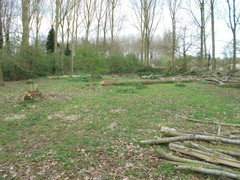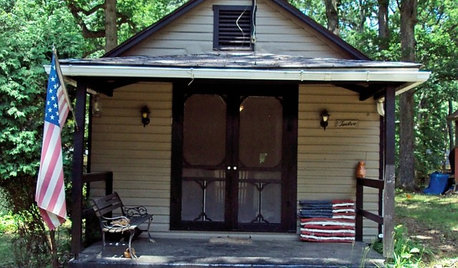A very un-american attitude....but still worth discussing.
User
9 years ago
Featured Answer
Sort by:Oldest
Comments (67)
mnwsgal
9 years agolast modified: 9 years agowoodyoak zone 5 southern Ont., Canada
9 years agolast modified: 9 years agoRelated Discussions
Call the Midwife by Jennifer Worth - DISCUSSION
Comments (70)I very much enjoyed the series "Call the Midwife." I have watched up to season 3. It was so refreshing to watch a show that doesn't overlook the hardships that women have faced, and to some degree still face. I live in Canada, and have seen a lot of US/Cdn TV which usually features wealthy and perfect conditions, beautiful movie stars, with little to no reality, and without touching on female perspectives. I saw a mention earlier about the lack of slums in Canada. I can only speak to the history of western Canada, which was mostly rural. In the 1950s, Western Canada enjoyed a high standard of living where there was ample food, although, my father did say that if you spent all your money on frivolous things you could starve. Before that, especially during the Great Depression, my grandfather had a sister who died because the family couldn't afford the medicine for her, and his mother saved for years after to pay the hospital for her daughter's death there. They lived in fear that the bank would take their house, but almost every house was in foreclosure in their area, Vancouver BC. My grandfather had a dairy cow he quite liked, and a garden, so it seems that western Canada was quite rural, even in the cities at that time, possibly with the exception of Chinatown, where the Chinese Canadians there had things quite rough. Today in Canada there seems to be a greater divide between rich and poor especially in the larger cities. Some of the issues in the book and movie still go on today, for example, abuse of women, children, losing a child, (although not as common today) being judged by others, mental illness after pregnancy and the great love we as mothers have for our children. I found it interesting that Jennifer Worth said most families lived near their parents, brothers and sisters, usually moving two streets away from where they grew up at most. Here in Canada we don't seem to have that closeness with family. Also there is a lot of privacy here and I think many mothers can feel isolated or suffer in silence. I don't live near my family because the housing prices and lack of jobs paying over minimum wage makes it very difficult to live there. Worh had another comment on the older people being rehomed to better living conditions, but that many of them died because they missed their friends and family and they didn't have that support. I found it interesting, and I think nowadays here in Canada, people's values are more about money than relationships which is sad too. In that way, the community of East London seemed to be better....See MoreTo Kill a Mockingbird, the discussion
Comments (34)Lydia, thanks for your response. The usual silence about the Mrs. Dubose episode has always puzzled me. I don't know if readers generally don't find it compelling or it is relatively unmemorable coming on the heels of the indelible image of Atticus shooting the mad dog. But I'm with you about that quote. It is Atticus's warning to Jem and foreshadows that the first baby steps of standing up to the status quo cannot be expected to succeed but are nonetheless necessary.It's when you know you're licked before you begin but you begin anyway and you see it through no matter what.It epitomizes Atticus's involvement, don't you think? I think it is one of the most powerful messages in all of TKaM.I am interested in how the novel is perceived by those from countries other than the U.S. Netla has already weighed in - I wonder if there is any equivalent to this way of life and the beliefs expressed in the novel in other places? Those of us from the industrial north might view the novel as though it is in fact from other country!Siobhan, I'm sure you would prefer to hear directly from readers outside the U.S., but your question interested me so I asked two of my non-U.S. friends about what they think. I thought I would share their responses. The first friend was born, bred, and still lives in Yorkshire. She says that she half-expected TKaM to be completely foreign to her. Instead she found that, although many of the characteristics make the place and people of TKaM unique to the American South, there were just as many instances in which she could identify. She feels that Maycomb could almost be any small town in England, with similar eccentrics, prejudices, and pathos. She sees the theme as universal to the human condition. My second friend is Argentinian. She says what enchanted her so much was the children's day-to-day lives: how they were left to their own devices and how safe their world seemed until, of course, things were no longer safe for them. I think I have profoundly thoughtful friends! An experience of mine: I tried to read Ne tirez pas sur l'oiseau moqueur, but I finally gave up because Jem and Scout speaking French just seemed too incongruous to me. It makes me wonder how many English translations come out sounding absurd to the speakers of the language the story was originally written in....See MoreRP Discussion: The Turn of the Screw
Comments (43)I never could decide which kind of story I thought it was: a psychological ghost story or a psychological thriller. I do know it is one of the spookiest stories I have read, in a purely psychological sence. Contrary to some of you, I did not find James's style that difficult to follow, although I agree it is complicated. (I remember thinking it would be very hard to translate his style). This probably has to do with being used to reading some extremely hard-to-follow stuff my countrypeople have written in English, using Icelandic sentence structures. James is easy by comparison....See MoreDiscussion: Angle of Repose
Comments (78)Hello, Woodnymph! I was alerted to your message by someone who lurks at HT. I have nothing to add to this discussion; it's pretty complete. I loved AOR for three reasons. First, it was a fascinating family history, tragic indeed but it rang true emotionally. Second, his link to the New England Transcendentalists intrigued me, as I had read nothing more about them since Emerson, in high school. And most of all, his description of the West is nonpareil, especially for those of us who live here and have traveled throughout the region. Whether it's the desert or the Sierra Nevadas or the Montana sky, Stegner makes it sing! Did you know that he's also a well-regarded historian? I have his book "The Gathering of Zion: The Story of the Mormon Trail" in my TBR pile, and am thinking of reading it next. He would tell that story with no glossing over the blemishes, but with much sympathy....See Morejadeite
9 years agolast modified: 9 years agoTexasRanger10
9 years agolast modified: 9 years agoms_xeno
9 years agolast modified: 9 years agogyr_falcon
9 years agolast modified: 9 years agoTexasRanger10
9 years agolast modified: 9 years agoTexasRanger10
9 years agolast modified: 9 years agoprairiemoon2 z6b MA
9 years agolast modified: 9 years agoUser
9 years agolast modified: 9 years agorouge21_gw (CDN Z5b/6a)
9 years agolast modified: 9 years agomolanic
9 years agolast modified: 9 years agowantonamara Z8 CenTex
9 years agolast modified: 9 years agoTexasRanger10
9 years agolast modified: 9 years agoryseryse_2004
9 years agolast modified: 9 years agofloral_uk z.8/9 SW UK
9 years agolast modified: 9 years agoUser
9 years agolast modified: 9 years agoUser
9 years agolast modified: 9 years agoUser
9 years agolast modified: 9 years agoUser
9 years agolast modified: 9 years agoUser
9 years agolast modified: 9 years agoUser
9 years agolast modified: 9 years agoTexasRanger10
9 years agolast modified: 9 years agoUser
9 years agolast modified: 9 years agoTexasRanger10
9 years agolast modified: 9 years agosoutherngardening24
9 years agolast modified: 9 years agojadeite
9 years agolast modified: 9 years agoTexasRanger10
9 years agolast modified: 9 years agowantonamara Z8 CenTex
9 years agolast modified: 9 years agoprairiemoon2 z6b MA
9 years agolast modified: 9 years agomolanic
9 years agolast modified: 9 years agorusty_blackhaw
9 years agolast modified: 9 years agowantonamara Z8 CenTex
9 years agolast modified: 9 years agoTexasRanger10
9 years agolast modified: 9 years agoTexasRanger10
9 years agolast modified: 9 years agoterrene
9 years agolast modified: 9 years agojld65
9 years agolast modified: 9 years agocatkin
9 years agolast modified: 9 years agoyardenman
9 years agolast modified: 9 years agofloral_uk z.8/9 SW UK
9 years agolast modified: 9 years agoUser
9 years agolast modified: 9 years agowantonamara Z8 CenTex
9 years agolast modified: 9 years agomxk3 z5b_MI
9 years agolast modified: 9 years agoUser
9 years agolast modified: 9 years agowantonamara Z8 CenTex
9 years agolast modified: 9 years agoMin3 South S.F. Bay CA
9 years agolast modified: 9 years agowantonamara Z8 CenTex
9 years agolast modified: 9 years agoTexasRanger10
9 years agolast modified: 9 years agoTexasRanger10
9 years agolast modified: 9 years agokatob Z6ish, NE Pa
9 years agolast modified: 9 years ago
Related Stories

MODERN ARCHITECTUREDesign Workshop: Additions With Attitude
Learn the strategies that can make extensions to existing home structures meaningful, respectful and of their time
Full Story
CONTRACTOR TIPS10 Things to Discuss With Your Contractor Before Work Starts
Have a meeting a week before hammers and shovels fly to make sure everyone’s on the same page
Full Story
KITCHEN COUNTERTOPSKitchen Counters: Granite, Still a Go-to Surface Choice
Every slab of this natural stone is one of a kind — but there are things to watch for while you're admiring its unique beauty
Full Story
MOST POPULARHow to Hang the American Flag at Home
We’ll show you how to display the American flag on your house for Memorial Day, the Fourth of July or all year round
Full Story
ROOTS OF STYLERoots of Style: The Indelible Charm of American Tudors
Rich details and an intimate scale give this English-inspired architectural style memorable character and flexibilty
Full Story
GARDENING GUIDESBackyard Birds: How to Care for American Goldfinches
The American goldfinch is a bright-in-the-summer visitor and one of the only vegetarian songbirds. Here's how to give them a healthy habitat
Full Story
FEEL-GOOD HOME12 Very Useful Things I've Learned From Designers
These simple ideas can make life at home more efficient and enjoyable
Full Story
ARCHITECTUREA Brief Recap of Historical American Home Design
Two contradictory desires have fueled American architecture since its birth. See how the tension has played out in home design
Full Story
CAPE COD DESIGNAmerican Architecture: The Elements of Cape Cod Style
This simple architecture style was born in New England but has stood the test of time around the United States
Full Story

















molanic